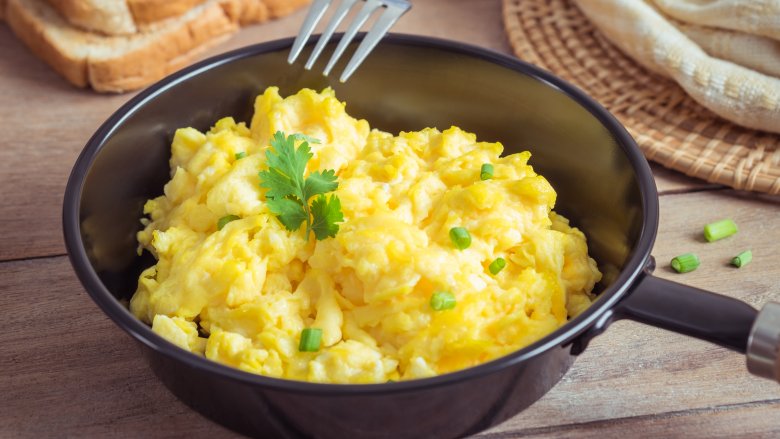The Secret Ingredient You Should Be Adding To Your Scrambled Eggs
Scrambled eggs are one dish that is best in its simplest state — just eggs, cooked in butter, seasoned with a little salt and pepper. Sure, you can always dress them up with cheese or sour cream or even mayonnaise, but with too many add-ins, you may wind up with an over-the-top omelet instead of the pristine perfection of pure scrambled eggs.
Speaking of add-ins, did you know there's really no need to add that splash of milk or cream when you're mixing your eggs? It's not going to make them fluffier — it just dilutes the flavor and makes them tough (via Southern Living). Oops. While scrambled eggs may be simple, they aren't necessarily the easiest thing to cook, as they are prone to drying out or going all rubbery if you don't treat them just right.
There is, however, one secret ingredient that won't do anything to detract from your eggs' delightful simplicity — in fact, this recipe hack comes from Real Simple, the lifestyle publication dedicated to keeping things, well, real. And simple. Though they're not claiming credit — this scrambled egg secret has also been endorsed by cookbook author Joy Wilson and Top Chef alums Stephanie Izard and Shirley Chung. The mystery ingredient? Soy sauce.
Soy sauce has actually long been touted as a salt substitute, with 1 teaspoon providing approximately the same seasoning power as 1 tablespoon of salt, yet it provides far less sodium than would the salt — according to the USDA, 1 teaspoon of soy sauce has 291 milligrams, while 1 teaspoon of table salt has 2,360 milligrams. Don Pringle, who served as executive chef at the Washington state restaurant Renee's on Camano, revealed that soy sauce was the secret ingredient he used on his roasted meats and in many of his sauces and marinades in place of salt. Many contestants in national barbecue competitions also use the salty seasoning in their sauces and marinades.
Barbara Tropp, former chef/owner at San Francisco's China Moon Cafe and another fan of using soy sauce in place of salt, advises that not all soy sauces are created equal. She highly recommends brewed sauces, which include the popular Kikkoman brand, as their color, flavor, and aroma come from the fermentation process. Synthetic soy sauces, which may include some bargain brands as well as the kind of soy sauce that comes in plastic single serve packets, gets its color and flavor from hydrolyzed vegetable protein and corn syrup, and may have a somewhat harsh flavor.
Soy sauce also comes in different varieties, including lighter Japanese varieties and darker Chinese ones. The latter will add more of an earthy flavor, and are perhaps not the best choice for a delicate dish like eggs, being better suited to heartier dishes like stew. Black soy sauce should definitely be avoided when subtle flavoring is called for, as it is made with molasses and has a very strong taste. For a salty taste with very little added sodium, Tropp recommends Kikkoman Lite, a reduced-sodium soy sauce.
But won't using soy sauce in your scrambled eggs make them taste like they should be in a stir-fry? No, not at all. While Real Simple has previously expressed the sentiment that scrambled eggs need little more than butter, salt, and pepper (and maybe a little grated cheddar, if you absolutely must gild the lily), they urge home cooks to try substituting soy sauce for salt, as it allows the seasoning to be more evenly dispersed prior to cooking. Salt, it seems, can sink to the bottom or even clump up, whereas soy sauce just dissolves right into those whisked-up eggs.
Sadly, there doesn't seem to be many readily-available liquid substitutes for black pepper, which would also be prone to clumping or sinking, but you could always try whisking in a splash of hot sauce instead. And here's some good news for the gluten-intolerant: You can always substitute the entirely wheat-free Tamari for soy sauce. It is a bit thicker and less salty than soy sauce, so you may need to use a bit more, and its slightly more intense flavor may be more noticeable in your eggs, but it still makes a decent clump-free, unsinkable scrambled egg seasoner. You can't beat that with a whisk!
